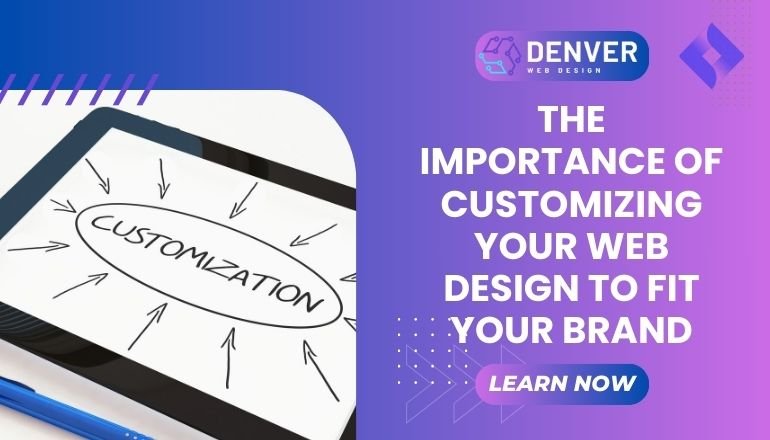
When people visit your website, they form an impression of your brand within seconds. A well-designed website is no longer optional—it’s a cornerstone for building trust, engaging users, and driving conversions. Customizing your web design to reflect your brand identity ensures that your online presence remains consistent, recognizable, and memorable. In this article, we’ll discuss best practices in web design and explore the key components of responsive web design to highlight the value of customization.
At Web Design Denver, we’ve seen how tailoring a website’s design can solve common issues like low engagement, high bounce rates, and weak branding. Let’s dive deeper into why customization is essential and how it can elevate your website to the next level.
What is Custom Web Design?
Custom web design refers to creating a website tailored specifically to your brand’s goals, aesthetics, and user needs, rather than relying on generic templates. Unlike pre-built solutions, a custom web design takes into account your brand identity—colors, logos, typography, and messaging—to craft a unique online experience.
Responsive web design plays a vital role in this process. By implementing adaptive design principles and mobile-first approaches, custom web designs ensure your site performs seamlessly across all devices, offering user-friendly navigation and a consistent experience.
Why is Customizing Your Web Design Essential for Your Brand?
Customizing your web design isn’t just about aesthetics—it’s critical for creating a meaningful connection with your audience. Here’s why:
- Brand Consistency: A custom website aligns with your visual and emotional branding. It strengthens brand recognition and fosters trust among users.
- Better User Experience (UX): Tailored features such as intuitive layouts and fast-loading pages ensure visitors can easily navigate your site, improving engagement and satisfaction.
- SEO and Search Engine Rankings: A custom site allows for proper SEO optimization, improving search engine visibility and increasing organic traffic. Factors like mobile-first design, site speed, and optimized content significantly boost Google rankings.
- Business Growth and Conversions: Personalized features—like product recommendations for e-commerce sites—enhance conversions and revenue potential.
At Web Design Denver, we emphasize creating responsive and user-friendly websites that are not just visually appealing but also designed to drive measurable results.
Key Features of a Custom Web Design
A customized website offers several standout components that elevate its value:
- Unique Visual Identity
Consistent branding through custom fonts, color schemes, and graphics builds a strong online presence. - Responsive Design
Ensures seamless performance on all devices, enhancing mobile accessibility and user experience. - Integration of Advanced Features
Examples include secure payment gateways for e-commerce web design, interactive contact forms, and dynamic multimedia elements. - SEO Optimization
Tailored strategies for meta tags, alt text, and internal linking boost visibility in search engines. - Scalability and Flexibility
Custom web designs are built to evolve with your business, allowing for new features and updates as needed.
Best Practices for Custom Web Design
To maximize the effectiveness of your custom web design, keep these actionable tips in mind:
- Start with Mobile-First Design: Given the dominance of mobile browsing, prioritize functionality and aesthetics for smaller screens first.
- Focus on Site Speed Optimization: Slow-loading websites are one of the top reasons users bounce. Optimize media files and use streamlined coding practices.
- Ensure Clear Navigation: Simplified menus, consistent CTAs, and logical page hierarchy improve usability and engagement.
- Incorporate SEO Best Practices: Build your site with clean, search engine-friendly code, optimize for keywords like “website redesign,” and use structured data for rich snippets.
Common Mistakes to Avoid in Web Design
When designing or redesigning a website, steer clear of these pitfalls:
- Using Templates with Limited Functionality: While quicker to deploy, templates often fail to capture the unique identity of your brand.
- Neglecting Cross-Browser Compatibility: Ensure your website performs equally well across different browsers and devices.
- Overcomplicating User Journeys: Avoid overwhelming users with too many options, cluttered layouts, or unclear CTAs.
- Ignoring SEO Fundamentals: Failure to optimize for search engines can result in low visibility and lost opportunities for growth.
Conclusion: The Value of Customizing Your Web Design
Custom web design is more than just a visual exercise—it’s a strategic investment in your brand’s future. By aligning your website with your unique identity, focusing on responsive design, and incorporating best practices, you can improve SEO rankings, increase user satisfaction, and boost business growth.
At Web Design Denver, we specialize in creating professional web development solutions tailored to our clients’ needs. Ready to take your website to the next level? Contact us today to start designing a site that truly reflects your brand and delivers measurable results.






